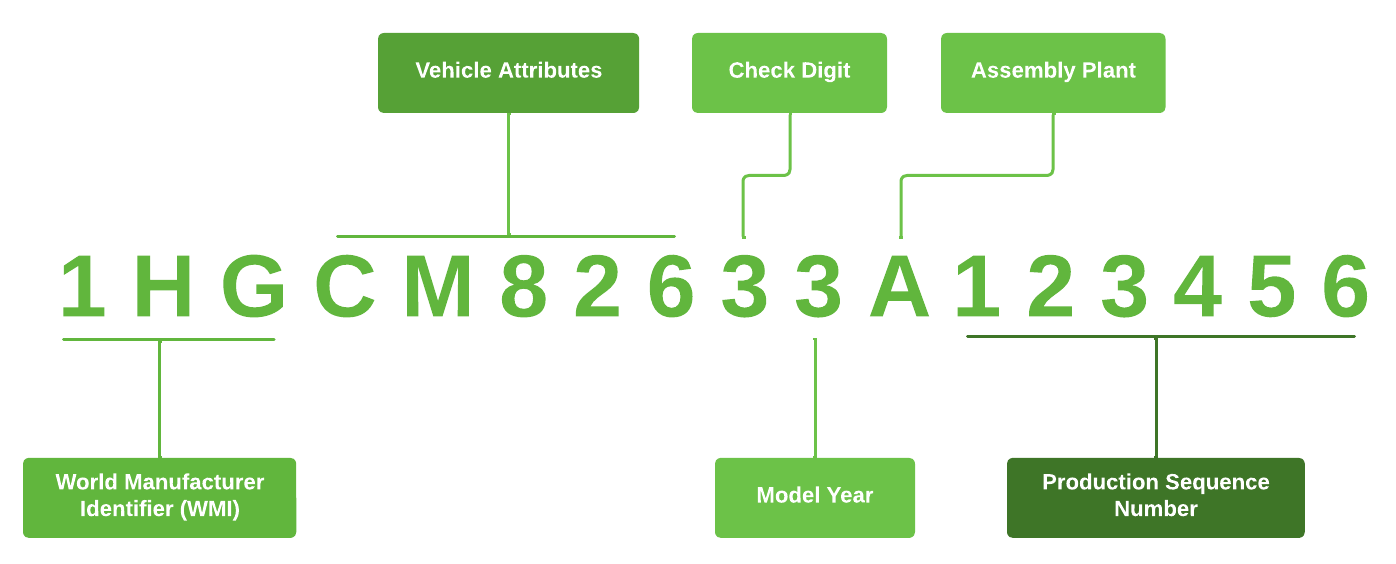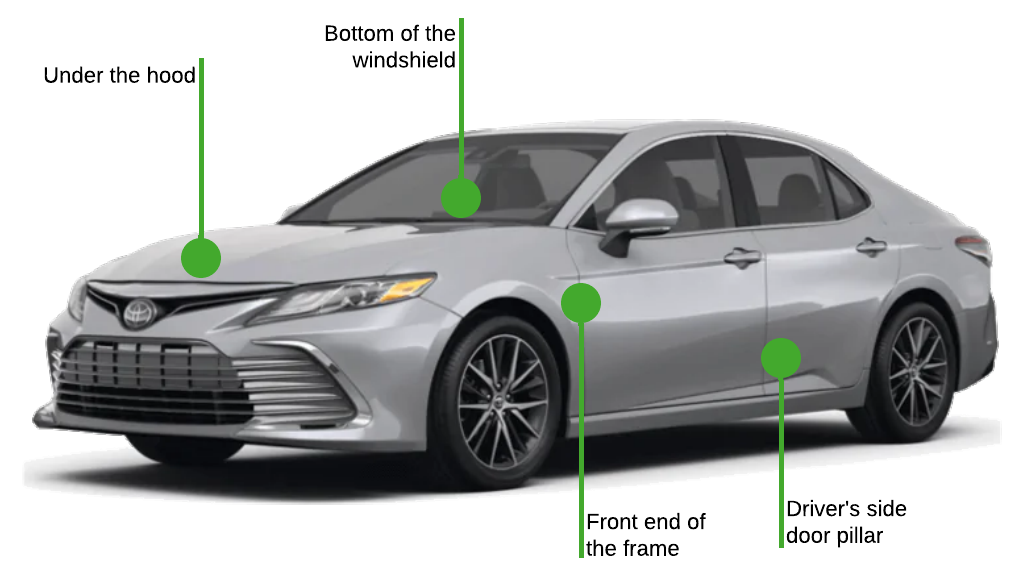Free Honda VIN Decoder & Lookup
Know Your Honda Better—Free Honda VIN Lookup for Specs, Title & Recalls
|
CHEROKEE CJ-5 CJ-7 CJ-8 SCRAMBLER COMANCHE COMMANDER |
COMPASS
GLADIATOR GRAND CHEROKEE GRAND WAGONEER J-10 J-20 |
LIBERTY
PATRIOT RENEGADE WAGONEER WRANGLER WRANGLER JK |
What You’ll Discover with a Honda VIN Decoder
A Honda VIN decoder is a powerful tool for uncovering hidden details about any Honda vehicle. Whether you’re checking a used Civic, verifying a CR-V in Texas, or confirming title history in California, decoding the VIN helps you stay informed and protected.
VinCheckPro.com’s free Honda VIN lookup helps you decode a Honda VIN to unlock vital information about your vehicle’s past and specs.
Explore the benefits of a free Honda VIN decoder below:
- VIN Verification – Confirms authenticity and format of the VIN.
- Make & Model – Identifies your Honda and its specific model (e.g., Civic, Accord, CR-V, Pilot).
- Trim Level – Details like LX, EX, Touring, or Sport are included.
- Body Style – Get info on whether it’s a sedan, coupe, SUV, etc.
- Engine Type – Learn the engine size, type, and fuel configuration (e.g., 1.5L Turbo).
- Production Year – Find out exactly when your Honda was built.
- Manufacturing Plant – See where your Honda was assembled.
- Safety Recalls – View any known recalls or technical bulletins tied to the VIN.
- Title History – Check for salvage, rebuilt, lien, or theft title status.
- Accident Records – Learn if the vehicle has been in a crash or had damage reported.
- Market Value – Use our tool to assess current market value based on location, condition, and mileage.
- Sales History – View how many previous owners the vehicle had.
- Odometer Reading – Verify reported mileage to avoid rollback scams.
- Insurance Records – Access reported claims and potential repair history.
- Warranty Info – See original and extended coverage details.
- Technical Specs – Discover drivetrain, transmission, fuel type, and more.
- Full VIN Report – Get a complete overview of all the above in one report.
Want to know even more? Check our free title check by VIN and vehicle lien check pages for deeper history.
Get to Know the Structure of a Honda VIN
The structure of a Honda Vehicle Identification Number (VIN) is a standardized code used to uniquely identify Honda vehicles. Here’s a breakdown of the typical structure of a Honda VIN:

World Manufacturer Identifier (WMI)
The first three characters of the VIN represent the World Manufacturer Identifier, which identifies the vehicle’s manufacturer, country of origin, and vehicle type. For Honda vehicles, this section typically starts with “2HG,” “JHM,” or “SHH.”
Sample VINs:
| 1HF – Honda of America Mfg., Inc. – Honda, Motorcycle, ATV, UTV |
| 1HG – Honda of America Mfg., Inc. – Honda, Passenger car |
| 7A3 – Honda New Zealand – Honda, Passenger car |
| JHF – Honda Motor Co., Ltd. |
| YC1 – Honda Belgium NV – Honda, Motorcycle |
Vehicle Descriptor Section (VDS)
The characters in positions four through eight provide information about the model name, body type, transmission, and grade. The check digit corresponds to the 9th.
Positions 4 – 6 (Model)
| AP1 – S2000, 2.0L VTEC F20 engine 2000-2003 |
| RW1 – CR-V (2 Wheel drive) 1.5L DOHC VTC turbo 2017-2022 |
| DB8 – Integra GS-R 4-door 1.8 liter DOHC VTEC B18C1 engine 2000-2001 |
| NA1 – NSX 3.0 liter DOHC VTEC V6 2000-2005 |
Position 7 (Body Type)
| 2 – 2-door coupe |
| 6 – 4-Door Sedan, Automatic (1987-2009) |
| 8 – 5-Door Multipurpose Passenger Vehicle, Automatic, Class C GVWR (07-09 RDX) |
| F – 4-Door Pickup Truck, Automatic, Class D GVWR (17-20 Ridgeline 2WD) |
Position 8 (Grade & Restraint System)
| 6 – Accord DX Hatchback with “passive” seat belts (1983 – 1987 Honda) |
| 2 – Civic DX 4-door (01) with Dual Airbags (2000 – 2009 Honda) |
| 5 – Insight (00-06) with Dual Airbags (2000 – 2009 Honda) |
| 3 – TL Special Edition (’13-’14) with Dual Airbags & Side Airbags & Side Curtain Airbags |
Position 9 (Check Digit): The ninth character is a check digit used to verify the accuracy of the VIN. It’s calculated based on the other characters in the VIN and helps detect any errors or tampering.
Vehicle Identifier Section (VIS)
The characters in positions 10 through 17 are part of the Vehicle Identifier Section (VIS), which gives you key details about the vehicle. The 10th character tells you the model year, the 11th shows where it was built, and the last six (12th to 17th) form the unique serial number that sets this vehicle apart from others of the same make and model.
Position 10 (Model Year): The tenth character indicates the model year of the vehicle. It can be a letter or number, representing years from 1980 onwards. For example, “A” might represent 1980, “B” for 1981, and so on.
| Code | Years | Code | Years |
| A | 1980, 2010 | S | 1995, 2025 |
| B | 1981, 2011 | T | 1996, 2026 |
| C | 1982, 2012 | V | 1997, 2027 |
| D | 1983, 2013 | W | 1998, 2028 |
| E | 1984, 2014 | X | 1999, 2029 |
| F | 1985, 2015 | Y | 2000, 2030 |
| G | 1986, 2016 | 1 | 2001, 2031 |
| H | 1987, 2017 | 2 | 2002, 2032 |
| J | 1988, 2018 | 3 | 2003, 2033 |
| K | 1989, 2019 | 4 | 2004, 2034 |
| L | 1990, 2020 | 5 | 2005, 2035 |
| M | 1991, 2021 | 6 | 2006, 2036 |
| N | 1992, 2022 | 7 | 2007, 2037 |
| P | 1993, 2023 | 8 | 2008, 2038 |
| R | 1994, 2024 | 9 | 2009, 2039 |
11th Position (Assembly Plant): The eleventh character specifies the manufacturing plant where the vehicle was assembled.
| B – Lincoln, Alabama, USA |
| E – Greensburg, Indiana, USA |
| T – Takanezawa, Tochigi prefecture, Japan |
| 1 – Guangzhou, Guangdong, China (Wuyang-Honda Motorcycle Plant) |
| 4 – Lafayette, Indiana, USA (SIA plant) (1994-2002 Passport) |
Production Sequence (12th – 17th): The remaining characters, typically positions 12 to 17, represent the vehicle’s unique production sequence number. This number distinguishes one vehicle from another, even if they have the same make and model.
Knowing how a Honda VIN is structured helps you decode the important info it holds. This can be super useful for things like figuring out where the car’s from, checking if it has any recalls, or keeping your records straight.
Where to Find Your Honda VIN

Dashboard – Look through the windshield on the driver’s side, where the dashboard meets the glass
Driver’s Door Frame – Open the door and check the frame or pillar for a sticker or metal plate.
Under the Hood – Near the engine block or firewall; some Hondas have VIN labels in the engine bay.
Vehicle Documents – Check your registration, title, and insurance documents for the VIN.
Who Can Benefit from a Honda VIN Lookup?
- Honda Owners – Verify model details and service schedules with a quick Honda VIN decode.
- Used Car Buyers – Get the full story before buying with accident, title, and mileage checks.
- Honda Sellers – Improve your listings with verified specs and ownership history.
- Insurance Providers – Accurately calculate rates based on the vehicle’s true specifications.
- Honda Enthusiasts – Explore trims, packages, and options across various model years.
- Auto Researchers – Study trends in Honda engineering and production.
- Vehicle Appraisers – Assess real value using VIN-based specs and historical data.
- Repair Technicians – Use VIN-based specs for accurate parts and repairs.
Online Honda VIN Decoder Sources
A Honda VIN decoder pulls information from reliable government and private databases to give you a comprehensive picture of your Honda’s identity, from factory specs to past ownership.
Here’s where top free Honda VIN lookup services source their data:
- NHTSA (National Highway Traffic Safety Administration)
Offers recall data, crash safety ratings, and manufacturer-submitted specs. It’s a core source for decoding a Honda VIN and identifying potential safety issues. - Official DMV Sources
U.S. state DMVs hold registration, title, and lien records—ideal for spotting title issues like salvage or rebuilt status. This info is essential when buying a Honda in California or Texas. - Official Honda Website
Includes original trim details, body style, transmission, engine type, and factory-installed features. These records help decode a Honda VIN down to its blueprint. - Authorized Honda Dealerships
Dealership networks can contribute recent service records and factory warranty info. That’s a big win for those verifying maintenance or coverage before purchase. - Insurance Companies
Reveal claims history, accident records, or declared total loss events, adding context to a free Honda VIN lookup. - Auction & Car Sales Platforms
Uncover auction listings, bid prices, and vehicle condition grades. This data helps estimate your Honda’s market value, resale potential, or hidden issues.
Honda VIN Decoder FAQs
How do I find the best deals on Honda cars?
Monitor dealer websites, check seasonal sales, and use vehicle history data to negotiate better.
Should I consider buying a Honda hybrid?
If fuel efficiency and environmental concerns are priorities, Honda hybrids like the Insight or CR-V Hybrid are great options.
What are common add-ons or upgrades for Honda vehicles?
Popular options include all-wheel drive, Honda Sensing safety features, infotainment system upgrades, and premium trims.
Are Honda cars good for high-mileage use?
Yes, many Honda models are known to last over 200,000 miles with proper maintenance, making them excellent for long-term use or resale.
Other Resources for Honda Owners and Enthusiasts
Start Your Free Honda VIN Check Now
Don’t buy blind. Decode your Honda VIN today to unlock valuable vehicle info—free, fast, and trusted by thousands.